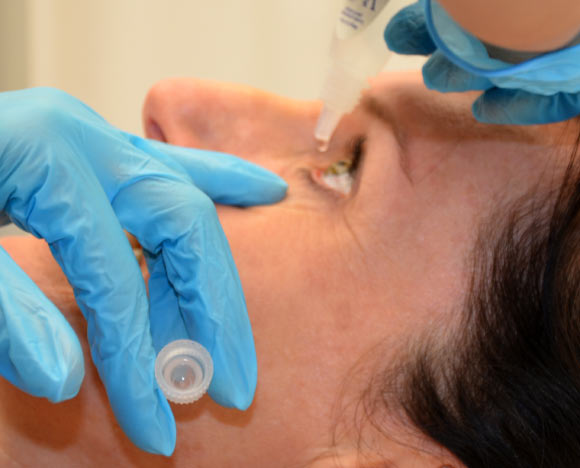Curcumin, a polyphenol extracted from turmeric (Curcuma longa), could be used in eye drops to treat the early stages of glaucoma and other eye diseases with neuronal pathology, according to a new study published in the journal Scientific Reports.

A medical professional applies eye drops to the eye. Image credit: British Columbia Institute of Technology / CC BY 4.0.
Glaucoma is a distinctive group of progressive optic neuropathies affecting over 60 million people worldwide and responsible for 8.4 million cases of irreversible blindness.
The condition mainly involves the loss of retinal ganglion cells, a type of neuron located near the surface of the retina. Stopping the loss of these cells early on has not yet been achieved, so it is a key focus of glaucoma research.
Curcumin has previously been shown to protect retinal ganglion cells when administered orally.
For the current study, Professor Francesca Cordeiro of UCL Institute of Ophthalmology and Imperial College London and her colleagues were seeking to find a more reliable method to deliver curcumin.
Oral administration is difficult because curcumin has poor solubility, so it does not easily dissolve and get absorbed into the bloodstream, and would require people to take large amounts of tablets that may cause gastrointestinal side effects.
The researchers developed a novel nanocarrier, wherein the curcumin is contained within a surfactant combined with a stabilizer, both of which are known to be safe for human use and are already in existing eye products.
The nanocarrier can be used in eye drops to deliver much higher loads of curcumin than other products in development, increasing the drug’s solubility by a factor of almost 400,000, and localizes the curcumin in the eyes instead of throughout the body.
The team initially tested the product on cells that are used to model glaucoma, before conducting trials in rats with eye conditions involving the loss of retinal ganglion cells.
After twice-daily use of eye drops in the rats for three weeks, retinal ganglion cell loss was significantly reduced compared to matched controls, and the treatment was found to be well-tolerated with no signs of eye irritation or inflammation.
Having found an effective way to deliver curcumin, Professor Cordeiro and co-authors are hopeful that it could also be used to diagnose Alzheimer’s disease, as curcumin is known to bind to the amyloid beta protein deposits implicated in Alzheimer’s, and can be detected in the retina with fluorescence to highlight the malignant proteins.
“Curcumin is an exciting compound that has shown promise at detecting and treating the neurodegeneration implicated in numerous eye and brain conditions from glaucoma to Alzheimer’s disease, so being able to administer it easily in eye drops may end up helping millions of people,” Professor Cordeiro said.
“We are now researching diagnostic uses for these eye drops alongside other ways to visualize the retina, as eye tests can be an opportunity to detect signs of neurodegeneration with a simple, non-invasive test,” added study first author Dr. Ben Davis, also from UCL Institute of Ophthalmology and Imperial College London.
_____
Benjamin M. Davis et al. 2018. Topical Curcumin Nanocarriers are Neuroprotective in Eye Disease. Scientific Reports 8, article number: 11066; doi: 10.1038/s41598-018-29393-8







